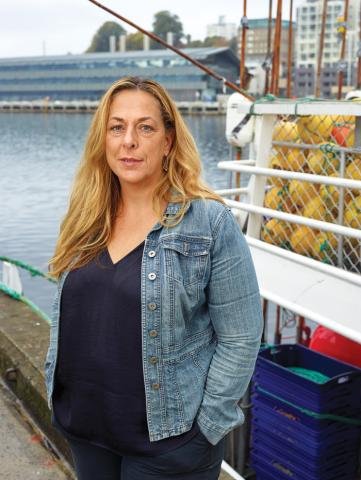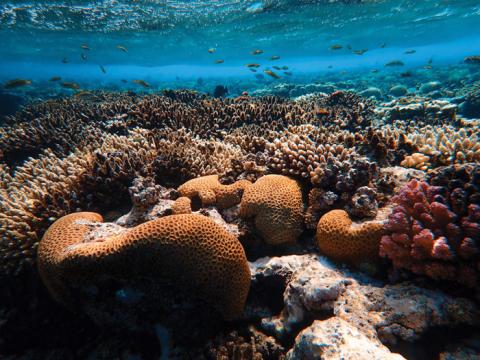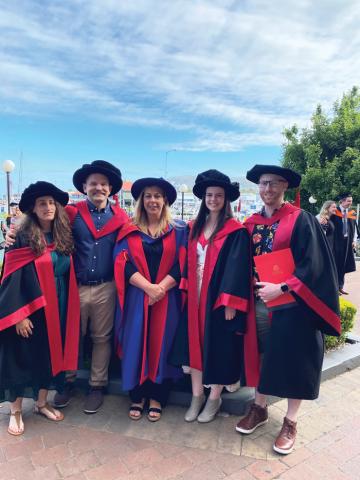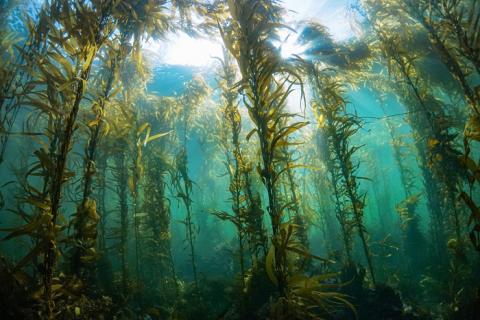Gretta Pecl has built a global reputation as a marine science communicator and advocate for citizen science. She is a leading voice in the call for urgent science-driven climate action to help fisheries survive
By Corrina Ridgway
Not even a poor Zoom connection across 2600 kilometres can diminish the clarity of Professor Gretta Pecl’s conviction for the urgency of science-driven climate action.
That sense of urgency has only increased with the completion of her recent work as a lead author for the Intergovernmental Panel for Climate Change (IPCC) Working Group II, which released the IPPC’s sixth climate report in February.
She says positive outcomes will be defined by proactive measures, and urgent changes are needed in human economic and social systems to limit climate impacts on marine systems. As Professor of Climate Change Ecology at the University of Tasmania (UTAS) and Director of the Centre for Marine Socioecology (CMS), it is a message that Gretta is well positioned to share.
Her long-time advocacy for citizen science and its role in informing and inducing positive change adds further weight and reach to her message.
But it has not been a straightforward path for Gretta to reach her current position. There was little in her childhood in Ballarat that linked her to either academia or the marine environment. After high school, she spent a few unsatisfying years as an insurance clerk before diving into a marine ecology degree that she started at UTAS and completed at James Cook University (JCU) in Queensland. A PhD at JCU followed.
In the competitive marine science field, her career has involved juggling a series of short-term grants and appointments to fund her work, including part-time work while her children were young. In all, there were 12 contracts over 19 years. Gretta was appointed as a professor and Director of the CMS before being awarded a permanent staff position.
In the first 15 years of her research career, Gretta focused on squid and other cephalopods. And as she studied their migration patterns, they provided her entrée into climate science, which led to her Redmap initiative.
Mapping change
Redmap is the Range Extension Database and Mapping project, which Gretta launched in Tasmania in 2009, combining marine ecology and citizen science. Redmap allows the public to photograph and log marine species that appear to be outside their expected geographic range. Images are then formally identified by species experts, adding to a living map of species distribution. The project went national in 2012.
“Knowledge is not just the domain of scientists; there are many different types of knowledge,” says Gretta. “People working in other roles in the marine environment and associated industries know heaps of things, and I see the Redmap project as a way of valuing and acknowledging some of the knowledge that they have.”
Redmap has highlighted the benefits of integrating scientific and public knowledge via citizen science. The collected data has been used for more than 25 journal articles and has been an important early indicator of species range shifts.
“In fact, about 20 per cent of all the knowledge we have on species range shifts in Australia comes from citizen science,” says Gretta.
The project has also helped build a positive perception of and trust in scientists and scientific methods. Recent research has shown that 97 per cent of people trust information from Redmap.
“I think there’s a long way to go, but projects that act as an interface between science and the public are really important for exposing how science works and what motivates scientists.
“Growing up with almost zero family or community interest in science has given me a strong sense of how siloed we are – it’s very easy when you’re in the field to forget what non-scientists don’t know and don’t get exposed to.”
But she stresses that dialogue and knowledge are a two-way street.
Public engagement has become a key factor in much of her work, including the ‘curious climate’ project. This was a joint initiative between the research community in Tasmania and ABC Radio for National Science Week 2019, designed to facilitate public education through dialogue, allowing the audience to ask questions and effectively control the topics discussed.
In 2021, the program was extended to involve school students across Tasmania. Almost 300 questions posed by more than 1000 school students were answered by 57 experts, using a combination of written material, videos and school visits.
The school program was timed to coincide with the United Nations Climate Change Conference in Scotland in November 2021, recognising heightened environmental and climate anxiety in children.
“Research shows the anxiety in kids is more about them seeing little government action around climate change, rather than a response to climate change itself,” Gretta says.
“We know that doom and gloom switches people off, but I personally feel quite hypocritical only doing optimism, because that’s not where we’re going.”


Isobel Sewell Photo: Peter Whyte
“I want to be able to look my kids in the eye and say that I did the best that I could with what I had at the time to try and engage people on the issue, answer questions, be approachable as a scientist – to really do the best that I can to communicate these things.”


Some ecosystems, such as the Great Barrier Reef, are likely to suffer irreversible damage as a result of climate change. Photo: Francesco Ungaro
Facilitating collaboration
One of her most recent projects is Future Seas 2030, an international and interdisciplinary collaboration led by the CMS in Tasmania. It explores both ‘business-as-usual’ (that is, where we are headed) and ‘more sustainable’ futures for our oceans.
Gretta’s work in Future Seas resulted in a special issue of the journal Reviews in Fish Biology and Fisheries, published in March 2022, and a multidimensional arts performance showcasing possible dual scenarios for the world with or without the changes we need to make for climate and environmental action.
The project involved 130 researchers, including a traditional owner and an Indigenous working group. Expertise was contributed from diverse perspectives: engineers, health experts, climate modellers, fisheries scientists and psychologists. Gretta believes that this type of societal, cultural and professional collaboration is needed when addressing climate change.
Gretta says it was an invaluable experience for researchers in their early careers, who led most of the research papers. It gave them an opportunity to lead big teams, learn to think in an interdisciplinary way, gain exposure to different aspects and use different lenses to look at their problem from all these different viewpoints. Senior researchers supported in advisory capacities.
Gretta says it was an incredible, eye-opening process. “As scientists, we don’t often get to sit back and look at the broader picture.”
Teamwork and mentoring are particularly satisfying for Gretta. “The best thing about my career is that I’m now in a position where I can facilitate other people’s careers and experiences.”
She is impatient with the hyper competitiveness of academia. “We don’t have time to muck around. Everyone works better if you’re lifting people up around you. I’m a trained ecologist. I’m not a social scientist, I’m not a professional communicator, nor a psychologist, but I partner and work with other people who have those skills.”


Gretta Pecl, centre, with some of her students at their graduation. Photo: Supplied
Ecology and climate
Beyond this sea of science communication and collaboration, Gretta has been active in several research fields, both in ecology and as CMS Director.
She also leads multiple research projects centred on climate-induced marine range shifts and responses. Her work in this area has evolved from her ecology background, driven by personal observations and a desire for answers.
Gretta says she became aware that things were changing in the early 2000s, but the enormity of climate change already underway hit home with the 2016 Great Barrier Reef bleaching event.
“I really expected that it would be the moment that Australia and the world would go, ‘Hang on a minute, this is going to disappear in our lifetime, this is serious’ and then do something. But nothing happened.”
The necessity for monitoring and understanding the ecological effects of climate change has influenced several of Gretta’s research projects. That work has included devising an assessment system to prioritise species that are vulnerable to climate change and have high ecological, economic and recreational value. In Tasmania, the Southern Rock Lobster (Jasus edwardsii) was identified as one of those species.
“Large changes induced by climate can happen on time scales that are relevant to commercial operations. We’ve seen this in range shifts of lobster and squid fisheries in Maine, in the US, and also in fisheries in Iceland.”
Gretta has most recently contributed to an FRDC research project analysing the opportunities and impacts of range-extending scalefish species. Led by UTAS colleague Associate Professor Sean Tracey, the research models the speed of range shifts for commercial target species, their likely ability to adapt to their new territory and impacts they may have there.
In some ways, it is a synthesis of Gretta’s previous work, combining citizen science with ecosystem modelling, population dynamics, range shifts and fisheries management.
She points out that damage to ecosystem-engineering species, such as the corals that form reefs and the kelps that create forests, may well be outpacing the range shift of commercial species. These changes may be driving the movement of species and may also jeopardise their ability to survive in new, but already damaged, locations.
Climate impacts
This issue was emphasised during her work as a lead author for the IPCC’s Working Group II that produced Climate Change 2022: Impacts, Adaptation and Vulnerability. Working Group II Contribution to the IPCC Sixth Assessment Report.
The report, released on 28 February 2022, outlined the trends and probabilities of climate change–induced impact on global systems.
“The findings from the report and the strength of the language were orders of magnitude stronger than in those reports preceding it,” Gretta says.
Her involvement originated from a desire to understand the IPCC process and to qualify the robustness of its reporting.
“In my science communication, I felt I spent a lot of time defending the IPCC, but it’s a very confusing beast. I wanted to be able to put my hand on heart and say conclusively that I knew how it worked, and knew it was robust, and be able to defend it in an honest way.”
The Australasian chapter identified nine key risks, of which over half related to natural system consequences.
Headline marine findings included damning evidence for increased habitat loss, particularly for coral reefs and kelp systems.
“Over 140,000 kilometres of kelp habitat has been lost since 2011 – we’ve already lost 90 per cent of our Giant Kelp in Tasmania,” says Gretta.
The increasing prevalence of extreme events in Australia was also reinforced. Of critical importance is that climate trends and extreme events have started to overlap, causing major ecosystem impacts. The report’s team found a very high level of confidence that some ecosystems, such as the Great Barrier Reef, would suffer irreversible damage.
The potential for all these disturbing developments to overwhelm us continues to rise, but Gretta is adamant that society must start to account for the true cost of activities that impact our natural world.
“We’ve not been factoring in the costs of carbon emissions and environmental damage that industries and businesses have been getting for free. Our world doesn’t work that way any longer. We have to factor in those costs.”
Marine futures
Climate change impacts will be numerous and cascading for fisheries. As the health of marine environments declines further, climate change impacts will not be restricted to economic loss due to changing catch or increased disease. Physical degradation of coastal communities, social disintegration, cultural loss and associated mental health issues are all clear and present dangers.
Gretta stresses that positive action will involve proactive adaptation in conjunction with expeditious mitigation. She outlines how extreme events could drain our society and economy so much that very few resources will be left to invest in adaptation.
“You’ve only got to look at the floods and fires recently to see that the events are happening so regularly that we’re getting compound events. It creates so many impacts that the potential for overwhelming the system is extremely high.”
She says real-time monitoring and information needs to underpin fisheries management plans that are more flexible and adaptive, and integrated ‘whole of ecosystem’ approaches should become a priority.
“Transparency, equity and trust are all going to be very critical, as there are going to be so many changes, and that means a lot of decisions need to be made.”
Gretta stresses how important fisheries and aquaculture are for Australia in terms of jobs, food production and other socioeconomic benefits. “It is really important we do all that we can to be prepared for climate change so that these industries continue to thrive.
“Being forewarned is forearmed. The more information we have, the more we work together and the stronger we collaborate across sectors and regions, the better off everyone will be.”


An IPCC report found that 90 per cent of Giant Kelp forests in Tasmania have been lost. Photo: Joanna Smart
Motivation
Gretta admits that the weeks since the IPCC report’s release have been emotionally draining. “I’ve had multiple reporters cry on me,” she says heavily.
She constantly reminds herself that every fraction of a degree of warming avoided leads to less pain and suffering.
“I’m really passionate about marine systems and fishing and diving and ecology – so I really want to have a role in making sure Australia’s marine sectors are prepared.”
However, her ultimate motivator is the next generation.
“I want to be able to look my kids in the eye and say that I did the best that I could with what I had at the time to try and engage people on the issue, answer questions, be approachable as a scientist – to really do the best that I can to communicate these things.” f
More information
www.ipcc.ch/report/ar6/wg2;
redmap.org.au
www.redmap.org.au/article/what-is-climate-change





